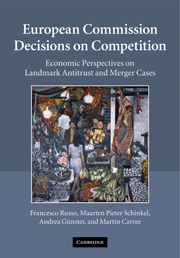 European Commission Decisions on Competition
European Commission Decisions on Competition Book contents
- Frontmatter
- Contents
- List of figures
- List of tables
- List of abbreviations
- Table of legislation
- Table of equivalences
- Acknowledgments
- 1 Introduction
- 2 Horizontal restrictions
- 3 Abuse of dominance
- 4 Licensing
- 5 Vertical restrictions
- 6 Joint ventures and alliances
- 7 Restrictions to competition by Member States
- 8 Mergers and acquisitions
- Annex I Decisions related to procedural issues
- Annex II Table of landmark decisions described in the book
- Annex III Table of mergers blocked by the European Commission in chronological order
- Annex IV Table of landmark merger decisions described in the book in alphabetical order
- Annex V Table of antitrust decisions in alphabetical order
- Bibliography
- Index
- References
7 - Restrictions to competition by Member States
Published online by Cambridge University Press: 04 August 2010
- Frontmatter
- Contents
- List of figures
- List of tables
- List of abbreviations
- Table of legislation
- Table of equivalences
- Acknowledgments
- 1 Introduction
- 2 Horizontal restrictions
- 3 Abuse of dominance
- 4 Licensing
- 5 Vertical restrictions
- 6 Joint ventures and alliances
- 7 Restrictions to competition by Member States
- 8 Mergers and acquisitions
- Annex I Decisions related to procedural issues
- Annex II Table of landmark decisions described in the book
- Annex III Table of mergers blocked by the European Commission in chronological order
- Annex IV Table of landmark merger decisions described in the book in alphabetical order
- Annex V Table of antitrust decisions in alphabetical order
- Bibliography
- Index
- References
Summary
Introduction
The FEU Treaty sets out rules to prevent distortions of competition in Europe and pursues that aim, regardless of the material author of the behavior that triggers the anticompetitive effects. Even though the competition rules (Articles 101 and 102) are addressed to undertakings, Member States may distort competition in various direct and indirect ways as well. In particular, states can allocate exclusive rights to undertakings that would effectively provide these companies with positions of dominance or (near-) monopoly.
In order to prevent this, the FEU Treaty imposes several obligations on the European Member States. The prominent set of obligations is imposed on the Member States by Article 106(1). It requires Member States to abstain from enacting or maintaining in force measures that are contrary to the rules of the Treaty. This holds in particular with regard to measures that may conflict with rules on competition in cases where the Member States grant special or exclusive rights to undertakings. The provisions of Article 106(1) permit Member States to create privileged firms or (legal) monopolies or to award respective rights, under the condition that the States adhere in those cases to the Treaty rules (on competition). The role played by the Court of Justice (ECJ) in the interpretation of Article 106 and of the derived obligations for Member States has been crucial. The ECJ has repeatedly ruled upon the relation existing between competition rules and the provision of services of general economic interest and between dominant position and legal monopolies.
- Type
- Chapter
- Information
- European Commission Decisions on CompetitionEconomic Perspectives on Landmark Antitrust and Merger Cases, pp. 301 - 311Publisher: Cambridge University PressPrint publication year: 2010


